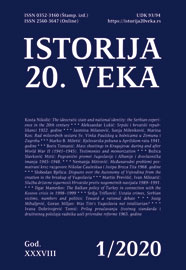MEĐUNARODNI PROBLEMI POSMATRANI KROZ RAZGOVORE NIKOLAE ČAUŠESKUA I JOSIPA BROZA TITA 1968. GODINE
INTERNATIONAL PROBLEMS VIEWED THROUGH TALKS BETWEEN NICOLAE CEAUȘESCU AND JOSIP BROZ TITO IN 1968
Author(s): Nemanja MitrovićSubject(s): Diplomatic history, Political history, International relations/trade, Post-War period (1950 - 1989), Cold-War History
Published by: Institut za savremenu istoriju, Beograd
Keywords: Yugoslavia; Romania; Josip Broz Tito; Nicolae Ceausescu; Prague Spring; 1968; Cold War;
Summary/Abstract: The importance of a scholarly study of Yugoslav-Romanian relations during 1968 comes from the fact that this cooperation had outgrown its bilateral context. Tighter contact between two countries was reflected in frequent and cordial visits of the highest-ranking officials. Among those contacts, the most important were meetings of the two heads of state, Nicolae Ceaușescu and Josip Broz Tito. In 1968 alone they met three times. The first meeting was in early 1968, the second was during the Romanian delegation's official visit from May 27 to June 1, and the third one happened just days after the Soviet intervention in Czechoslovakia. Mutual interests such as opposition to superpower hegemony, the defense of sovereignty and peaceful coexistence, independent foreign policy, and cooperation on equal terms, were especially stressed during the talks between Josip Broz Tito and Nicolae Ceaușescu. Hence these three visits were of special importance for understanding the relations between Yugoslavia and Romania in 1968. The main topics of the talks during the visits were: mutual consulting of the communist parties, relations with the USSR, international crises such as the one is the Middle East, but some crucial subjects also emerged during that eventful year, i.e. the non-proliferation deal and the events in Czechoslovakia. As one of the greatest emergencies of the Cold War, the Czechoslovakia crisis triggered a defense from potential foreign invasion and dominated Yugoslav-Romanian relations. The relations between Romania and Yugoslavia were on the rise for a number of years. That influenced Belgrade to support more independent policy of Bucharest. However, the crisis in Czechoslovakia also put a limit to this cooperation. During the talks in Vršac Tito clearly said that Yugoslavia is not ready for a military alliance which would provoke the Soviet Union. The talks in Vršac were the opportunity to define the limits of Yugoslav-Romanian cooperation.
Journal: Istorija 20. veka
- Issue Year: 2020
- Issue No: 1
- Page Range: 129-146
- Page Count: 18
- Language: Serbian

